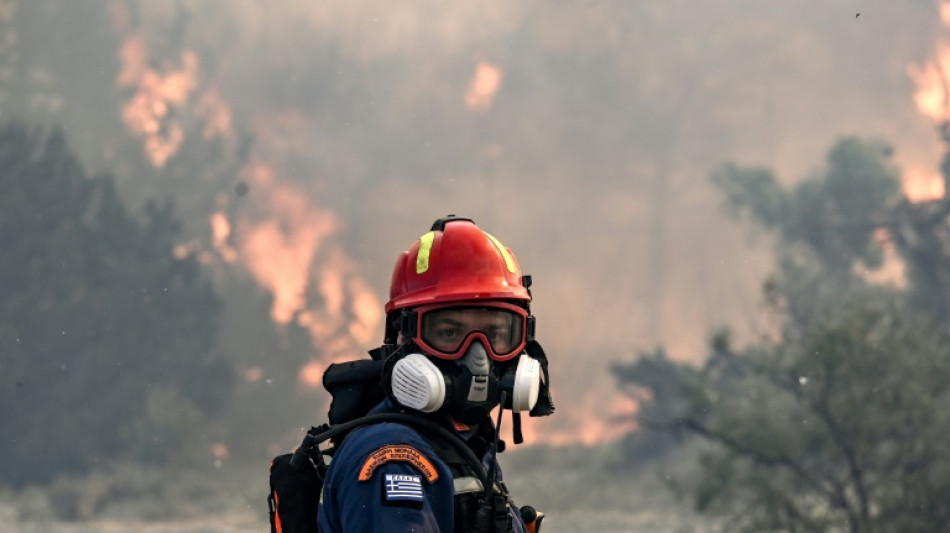
-
 Leftist, far-right candidates go through to Chilean presidential run-off
Leftist, far-right candidates go through to Chilean presidential run-off
-
Zelensky in Paris to seek air defence help for Ukraine

-
 Bangladesh verdict due in ex-PM's crimes against humanity trial
Bangladesh verdict due in ex-PM's crimes against humanity trial
-
A pragmatic communist and a far-right leader: Chile's presidential finalists

-
 England ready for World Cup after perfect campaign
England ready for World Cup after perfect campaign
-
Cervical cancer vaccine push has saved 1.4 million lives: Gavi

-
 World champion Liu wins Skate America women's crown
World champion Liu wins Skate America women's crown
-
Leftist leads Chile presidential poll, faces run-off against far right

-
 Haaland's Norway thump sorry Italy to reach first World Cup since 1998
Haaland's Norway thump sorry Italy to reach first World Cup since 1998
-
Portugal, Norway book spots at 2026 World Cup

-
 Sinner hails 'amazing' ATP Finals triumph over Alcaraz
Sinner hails 'amazing' ATP Finals triumph over Alcaraz
-
UK govt defends plan to limit refugee status

-
 Haaland's Norway thump Italy to qualify for first World Cup since 1998
Haaland's Norway thump Italy to qualify for first World Cup since 1998
-
Sweden's Grant captures LPGA Annika title

-
 Tuchel lays down law to Bellingham after England star's frustration
Tuchel lays down law to Bellingham after England star's frustration
-
Sinner caps eventful year with ATP Finals triumph over great rival Alcaraz

-
 Portugal book spot at 2026 World Cup as England stay perfect
Portugal book spot at 2026 World Cup as England stay perfect
-
Hakimi, Osimhen, Salah shortlisted for top African award

-
 Sinner beats great rival Alcaraz to retain ATP Finals title
Sinner beats great rival Alcaraz to retain ATP Finals title
-
Schenk wins windy Bermuda Championship for first PGA title

-
 Crime, immigration dominate as Chile votes for president
Crime, immigration dominate as Chile votes for president
-
Kane double gives England record-setting finish on road to World Cup

-
 World champions South Africa add Mbonambi, Mchunu to squad
World champions South Africa add Mbonambi, Mchunu to squad
-
Greenpeace says French uranium being sent to Russia

-
 'Now You See Me' sequel steals N. American box office win
'Now You See Me' sequel steals N. American box office win
-
Argentina beat Scotland after frenzied fightback

-
 Argentina beat Scotland after stunning fightback
Argentina beat Scotland after stunning fightback
-
Pope urges leaders not to leave poor behind

-
 Pressure will boost Germany in 'knockout' Slovakia clash, says Nagelsmann
Pressure will boost Germany in 'knockout' Slovakia clash, says Nagelsmann
-
Ecuador votes on hosting foreign bases as Noboa eyes more powers

-
 Portugal qualify for 2026 World Cup by thrashing Armenia
Portugal qualify for 2026 World Cup by thrashing Armenia
-
Greece to supply winter gas to war battered Ukraine

-
 India and Pakistan blind women show spirit of cricket with handshakes
India and Pakistan blind women show spirit of cricket with handshakes
-
Ukraine signs deal with Greece for winter deliveries of US gas

-
 George glad England backed-up haka response with New Zealand win
George glad England backed-up haka response with New Zealand win
-
McIlroy loses playoff but clinches seventh Race to Dubai title

-
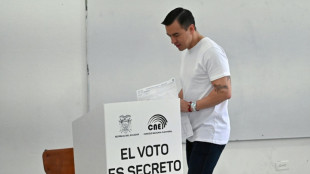 Ecuador votes on reforms as Noboa eyes anti-crime ramp-up
Ecuador votes on reforms as Noboa eyes anti-crime ramp-up
-
Chileans vote in elections dominated by crime, immigration
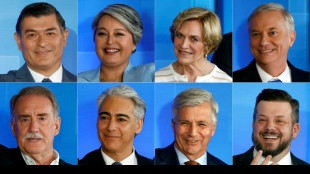
-
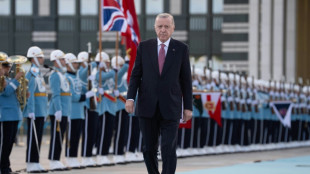 Turkey seeks to host next COP as co-presidency plans falter
Turkey seeks to host next COP as co-presidency plans falter
-
Bezzecchi claims Valencia MotoGP victory in season-ender

-
 Wasim leads as Pakistan dismiss Sri Lanka for 211 in third ODI
Wasim leads as Pakistan dismiss Sri Lanka for 211 in third ODI
-
Serbia avoiding 'confiscation' of Russian shares in oil firm NIS
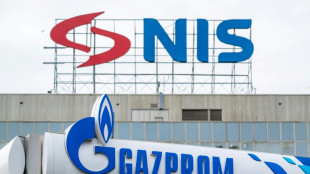
-
 Coach Gambhir questions 'technique and temperament' of Indian batters
Coach Gambhir questions 'technique and temperament' of Indian batters
-
Braathen wins Levi slalom for first Brazilian World Cup victory

-
 Rory McIlroy wins seventh Race to Dubai title
Rory McIlroy wins seventh Race to Dubai title
-
Samsung plans $310 bn investment to power AI expansion

-
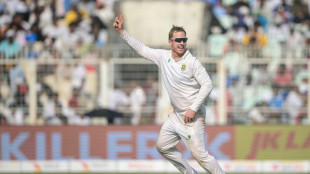 Harmer stars as South Africa stun India in low-scoring Test
Harmer stars as South Africa stun India in low-scoring Test
-
Mitchell ton steers New Zealand to seven-run win in first Windies ODI

-
 Harmer stars as South Africa bowl out India for 93 to win Test
Harmer stars as South Africa bowl out India for 93 to win Test
-
China authorities approve arrest of ex-abbot of Shaolin Temple


Earth to warm up to 2.9C even with current climate pledges: UN
Countries' greenhouse gas-cutting pledges put Earth on track for warming far beyond key limits, potentially up to a catastrophic 2.9 degrees Celsius this century, the UN said Monday, warning "we are out of road".
The UN Environment Programme's annual Emissions Gap report is released just ahead of crucial COP28 climate talks in Dubai and will feed into the global response to a sobering official "stocktake" of the failure to curb warming so far.
With this year expected to be the hottest in human history, UNEP said "the world is witnessing a disturbing acceleration in the number, speed and scale of broken climate records".
Taking into account countries' carbon-cutting plans, UNEP warned that the planet is on a path for disastrous heating of between 2.5C and 2.9C by 2100. Based just on existing policies and emissions-cutting efforts, global warming would reach 3C.
But the world continues to pump record levels of greenhouse gases into the atmosphere, with emissions up 1.2 percent from 2021 to 2022, UNEP said, adding that the increase was largely driven by the burning of fossil fuels and industrial processes.
UN Secretary-General Antonio Guterres called for the COP28 talks, which begin on November 30, to outline "dramatic climate action".
"Leaders can't kick the can any further. We're out of road," he said, denouncing a "failure of leadership, a betrayal of the vulnerable, and a massive missed opportunity".
He said the world "must reverse course" and called for a clear signal at the COP28 meeting that the world was preparing for a decisive move away from polluting coal, oil and gas.
- 'Snooze mode' -
The 2015 Paris Agreement saw countries agree to cap global warming at "well below" 2C above preindustrial times -- with a safer limit of 1.5C if possible.
Nearly 1.2C of global heating so far has already unleashed an escalating barrage of deadly impacts across the planet.
UNEP said temperatures have gone above 1.5C for more than 80 days already this year, although the Paris warming thresholds will be measured as an average over several decades.
The Emissions Gap report looks at the difference between the planet-heating pollution that will still be released under countries' decarbonisation plans and what science says is needed to keep to the goals of the Paris Agreement.
By 2030, UNEP said, global emissions will have to be 28 percent lower than current policies would suggest in order to stay below 2C, and 42 percent lower for the more ambitious limit of 1.5C.
UNEP chief Inger Andersen said it was crucial that G20 nations -- the world's wealthiest economies responsible for around 80 percent of emissions -- "step up" and lead on reductions, but noted some were in "snooze mode".
- 'Climate won't wait' -
Under the Paris deal, countries are required to submit ever deeper emission cutting plans, known as Nationally Determined Contributions (NDCs).
UNEP found that fully implementing "unconditional" NDCs for 2030 -- which countries plan regardless of external support -- would give a 66 percent likelihood of Earth's average temperature rising by 2.9C by 2100.
Scientists warn that warming of these levels could render vast swathes of the planet essentially uninhabitable for humans and risk irreversible tipping points on land and in the oceans.
Conditional NDCs -- which rely on international funding to achieve -- would probably lower this to a still catastrophic 2.5C temperature rise this century, it said.
UNEP said that if all conditional NDCs and longer-term net zero pledges were met in their entirety it would be possible to limit temperature rise to 2C.
But it cautioned that currently these net zero pledges were not considered credible, with none of the G20 nations reducing emissions in line with their own targets.
Even in the most optimistic scenario, the chance of limiting temperature rise to 1.5C is just 14 percent, UNEP said.
Guterres called for "an explosion of ambition" regarding countries setting their NDCs -- which are due to be updated by 2025.
Andersen said she is optimistic that countries will be able to make progress at the November 30 to December 12 COP28, despite the fractures caused by Russia's invasion of Ukraine and the conflict between Israel and Hamas.
"Countries and delegations understand that, irrespective of these deep divisions that do exist and that are undeniable, the environment doesn't wait and climate most certainly will not," she said.
"You can't press the pause button."
Z.AbuSaud--SF-PST




